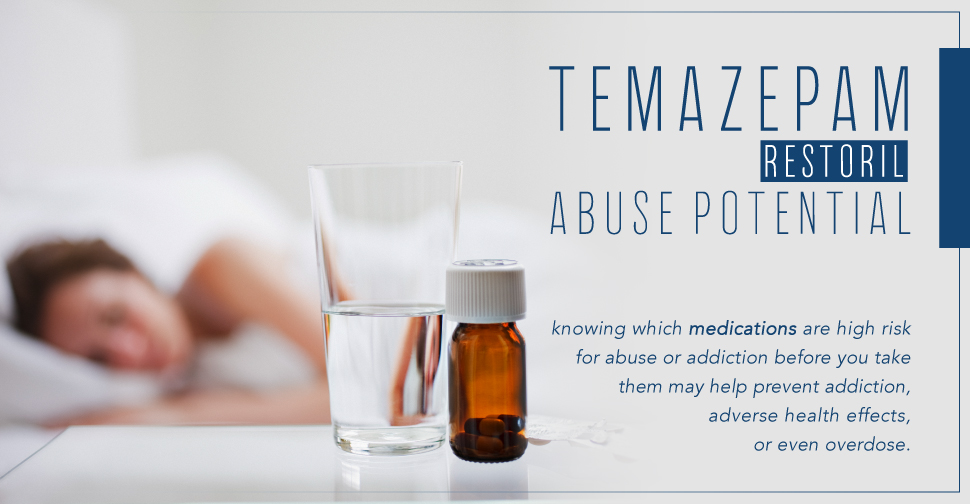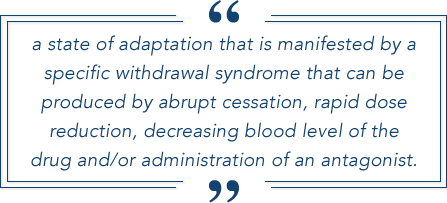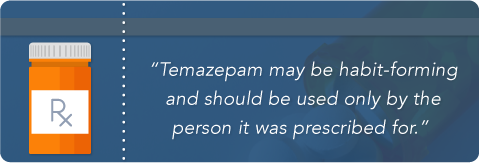
While many people are able to take prescription medication safely and responsibly, more than 20 percent of people in the United States have admitted to using drugs for nonmedical purposes in their lifetimes. With new medications developed all the time, it can be difficult to know which ones may be safe, and which hold high risks for abuse or addiction. Yet knowing which medications are high risk for abuse or addiction before you take them may help prevent addiction, adverse health effects, or even overdose. One drug that may put a person at risk of abuse or addiction is temazepam, a drug under the brand name Restoril.

Temazepam Defined
Temazepam is a benzodiazepine drug usually used to treat people who experience troubles with sleeping (insomnia). Because of its dangerous side effects, temazepam is not to be taken by pregnant or nursing women. Further, as Drugs.com explains, “Temazepam may be habit-forming and should be used only by the person it was prescribed for.” In particular, this medication should not be shared with anyone who has had a history of drug abuse or addiction, as “misuse of habit-forming medication can cause addiction, overdose, or death.”
How It Works
According to Everyday Health, benzodiazepines work in the body by enhancing the effects of gamma-aminobutyric acid, or GABA, within the brain. GABA is a chemical, or neurotransmitter, in the brain responsible for sending messages from one nerve cell to another. GABA reduces anxiety and brain activity—essentially allowing you to sleep. For people who experience insomnia, that may result in high brain activity or anxiety, making it difficult to sleep, benzodiazepines work to enhance the results of GABA and increase a person’s ability to sleep and stay asleep.
Potential For Abuse
Because of its high potential for abuse, temazepam is typically only prescribed for a short time. In fact, it should not be used for more than seven to ten days. This is because the body can develop a tolerance to or physical dependence on the effects of it in a short time. Tolerance occurs when a person no longer feels the effects of a medication he or she is taking. A physical dependence, as Rx List explains, “is a state of adaptation that is manifested by a specific withdrawal syndrome that can be produced by abrupt cessation [stopping use], rapid dose reduction, decreasing blood level of the drug and/or administration of an antagonist.”

In other words, when a person develops a physical dependence to a substance, that person’s body adapts to rely on the physical effects produced by the drug. Unfortunately, when people no longer feel the effects of medication due to tolerance, they may try to take more of it in order to achieve the desired effects. This puts them at greater risk for addiction and overdose, the latter of which can be fatal in some cases.
People who have abused other substances are at higher risk for developing addiction to temazepam. For those who are abusing temazepam and stop abruptly, withdrawal can occur, which may result in some adverse health effects, such as:
- Abdominal cramps
- Anxiety
- Flushed skin
- Nausea
- Tremors
- Vomiting
People who are suffering from temazepam abuse and are undergoing withdrawal may need medical attention, as withdrawal can be difficult to attempt alone. In order to avoid extreme symptoms, it may even be necessary to wean a person slowly from use of the drug by tapering the dose a little at a time. In this case, a person should be monitored to ensure the safety of this method.
What To Do If You Are Suffering From Abuse
If you or someone you know are in the early stages of prescription drug abuse, then perhaps you may be wondering if you should seek treatment. Withdrawal can occur if a person tries to stop abusing a substance and can range from moderate to severe. To avoid these effects, it may be best to seek treatment. With more severe forms of abuse, such as addiction, this process may begin with detoxification—a process geared towards ridding the body of harsh chemicals built up from abuse, while also tempering symptoms of withdrawal.
In addition, overdose is a real possibility for people who abuse substances. Even if an overdose is not fatal, it can be detrimental to a person’s health. Overdose can occur from taking too many doses in a short period of time or from too much of a substance acquired over time. Some overdose signs to look for are:
- Confusion
- Extreme drowsiness
- Fainting
- Feeling lightheaded
- Seizure
- Slowed heartbeat or breathing
- Slurred speech
- In extreme cases, coma
If you or someone close to you is exhibiting these signs of prescription drug overdose, don’t hesitate—seek medical attention immediately, as your life may be in jeopardy. This risk of fatality increases with concurrent alcohol use and abuse.
How To Get Help For Substance Abuse
Prescription drug abuse can be a dangerous, addicting habit, but it doesn’t have to be. Part of prevention is knowing your medication, refusing to share it with others, and cautiously following prescription directions for dosage and frequency. If you are suffering from abuse, though, there is help waiting for you when you are ready to receive it.
Don’t wait any longer—contact us today at DrugRehab.org to hear about treatment plans and get professional support in choosing one that is right for you.
Sources
Drugs.com —Temazepem
Everyday Health — Temazepem
National Institute On Drug Abuse — Misuse Of Prescription Drugs
Rx List —Temazepem


